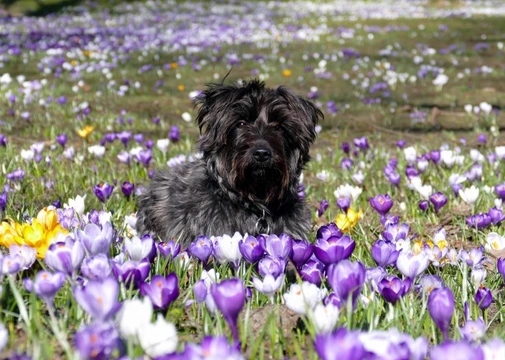
Keeping your dog safe at Easter
The start of spring each year is a lovely season, as we start to forget about the long dark nights and cold of the winter, and start to look forwards to the warmer months of the year. March or April each year also means Easter, which this year falls a little late, in April-and of course, a huge range of people from all walks of life celebrate the season from either a religious perspective, or as an excuse to eat lots of chocolate eggs!
The Easter bank holiday is the first bank holiday after Christmas and New Year, and of course, most people have an extra day off work, children are off school, and everyone is looking forwards to the chance to relax!
For people with dogs, there are lots of ways to get your pooch involved in the fun, but Easter time can also be potentially dangerous to dogs, given the amount of chocolate involved, often in the hands of children-and so it is really important to keep your dog safe, and not to let them get their paws on anything naughty!
In this article we will look at how you can keep your dog safe and happy around the Easter period, and how to ensure that they don’t eat anything that they shouldn’t whilst everyone’s attention is elsewhere. Read on to learn more.
Chocolate is toxic to dogs!
First things first, it is important that all dog owners understand that chocolate is toxic to dogs, and if you have any dog-owning friends, make sure that you spread the word and ensure that they know this. Dogs should never be given chocolate, and whilst it takes a certain strength and amount to make a dog sick (depending on their size and other factors) dogs should not get the taste for it, or be allowed to scavenge or beg.
At Easter when chocolate is prolific and often, can be found in the oddest places when Easter egg hunts are going on, take special care to ensure that nobody is feeding your dog a snack.
Easter egg hunts
If you set up an Easter egg hunt for your children in your home or garden, make sure that you make a note of where they are all hidden, and that none are left behind or misplaced after the event. Dogs may well want to get involved in the running around and excitement that this involves, but only allow this to happen if you are sure that they cannot get to the eggs on their own, and that no one will share their spoils!
If necessary, place the eggs (and other chocolate) in Tupperware or boxes that your kids will be able to find, but that your dog won’t be able to get into. If you are keen to involve your dog, you can also of course hide dog treats for them to find in likely places too!
Additionally, even a few days either side of Easter day itself, be speculative when outside of the home walking your dog, in case an Easter egg hunt is or will be taking place nearby. Some dogs are very quick at scavenging and gulping down food before you can stop them, so if this sounds like your own dog, consider muzzling them or keeping them on a lead during this time.
Other hazards
Daffodils and other early flowers tend to be prolific around Easter too, and while dogs don’t generally pay them a lot of attention (other than potentially trying to pee on them!) the bulbs can be toxic if ingested, so keep an eye out if your dog is digging around flowers, or appears to have turfed up some bulbs.
In terms of other popular Easter food, things like Simnel cake and other Easter cakes are usually rich in raisins and sultanas, both of which are toxic to dogs, along with other products from within the grape family. This means that it is not a good idea to give your dog a piece as a treat.
Many people also have a roast dinner on Easter day itself, and the usual rules apply here when it comes to your dog-don’t give them scraps or bits unless you are sure what is in them, and bear in mind that things like gravy and stuffing often contain onion and/or garlic, both of which are bad for dogs.
It can be hard to ensure that your dog doesn’t get the opportunity to steal some cake, chocolate or other food at Easter if you have kids, who will likely be very excited themselves and having a great time-which is why it is extra important to keep an eye on what your dog is up to, where they are-and if they have gone uncharacteristically quiet, why this might be!



